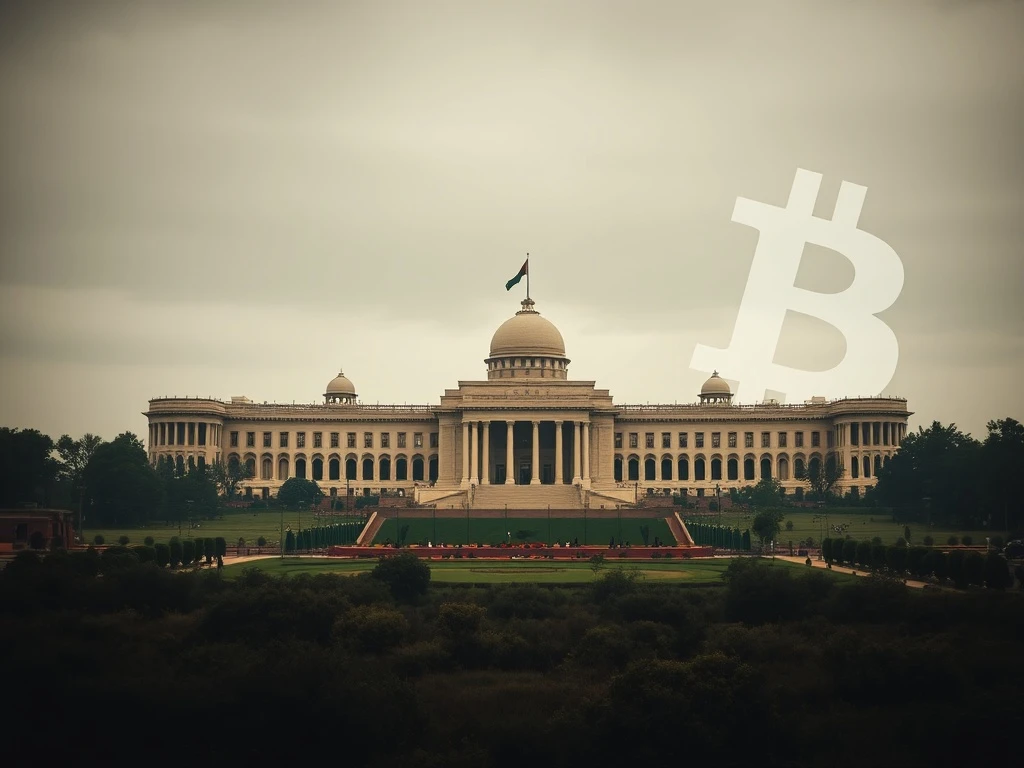Pakistan Bitcoin Mining Plan Faces **Critical** IMF Rejection

Pakistan’s ambitious venture into large-scale Bitcoin mining has hit a significant snag. What was once heralded as a strategic move to leverage surplus energy and boost the digital economy now faces an uphill battle, primarily due to the International Monetary Fund’s (IMF) stern rejection of proposed power subsidies. This development casts a long shadow over the nation’s burgeoning crypto aspirations and raises crucial questions about the delicate balance between economic development and international financial stability.
The Ambitious Pakistan Bitcoin Mining Plan and Its Origins
For a nation often grappling with economic challenges, Pakistan’s pivot towards leveraging its energy surplus for crypto mining seemed like a pragmatic solution. The plan, spearheaded by the Pakistan Crypto Council and backed by the Ministry of Finance, aimed to allocate a substantial 2,000 megawatts of surplus electricity to energy-intensive industries, including Bitcoin (BTC) mining and AI centers. This initiative wasn’t just about utilizing dormant resources; it was part of a broader digital transformation agenda designed to attract foreign investment and stimulate economic growth.
Key figures like Finance Minister Muhammad Aurangzeb had even announced tax incentives for AI centers and duty exemptions for Bitcoin miners, signaling a strong governmental intent to foster this new sector. The idea of using the country’s runoff energy to fuel Bitcoin mining was first proposed by Saqib at the Crypto Council’s inaugural meeting, which brought together a diverse group of stakeholders including lawmakers, the Bank of Pakistan’s governor, and the chairman of the Securities and Exchange Commission.
Why Did the IMF Reject Pakistan’s Crypto Mining Subsidies?
The core of the issue lies in the IMF’s deep-seated concerns about economic stability. According to reports, the IMF has outright rejected Pakistan’s proposal to offer subsidized power to industries like crypto mining. Fakhre Alam Irfan, Pakistan’s Secretary of Power, conveyed to the Senate committee on energy that the IMF believes such measures could significantly distort the energy market and exacerbate existing issues within the country’s fragile power sector. Even with Pakistan having excess electricity, especially during winter, the IMF remains wary of pricing schemes that could disrupt the market balance.
The Power Division’s November 2024 plan had proposed a marginal-cost tariff of 22–23 rupees per kilowatt-hour for industries such as copper smelting, data centers, and crypto mining. Officials argued this scheme would boost electricity demand and help absorb surplus capacity. However, the IMF reportedly dismissed the plan, drawing parallels to sector-specific tax breaks that have historically led to economic imbalances in Pakistan. This highlights the IMF’s cautious approach, rooted in past experiences where similar policies created unintended negative consequences for the nation’s fiscal health.
The Broader Implications of the IMF Crypto Stance
The IMF’s decision is not just about power subsidies; it reflects a broader concern about financial prudence and market integrity. For Pakistan, a country heavily reliant on IMF assistance, adherence to its recommendations is often non-negotiable. Secretary Irfan emphasized that all significant energy policies must receive IMF approval, underscoring the powerful influence the international body wields over Pakistan’s economic direction.
This rejection forces Pakistan to re-evaluate its strategy for integrating cryptocurrencies into its national economic framework. While the proposal hasn’t been entirely shelved, it is now under review by the World Bank and other international partners. The government is actively working on refining the plan with input from these institutions, suggesting a path towards a more sustainable and IMF-compliant approach, potentially without direct power subsidies.
Beyond Mining: Pakistan’s Vision for a National Bitcoin Reserve
Interestingly, Pakistan’s crypto ambitions extend beyond just mining. Saqib, a key figure in Pakistan’s crypto push, has also announced plans for a national Bitcoin reserve. This bold move, reportedly reaffirmed during discussions with MicroStrategy’s Michael Saylor at the Bitcoin 2025 conference, indicates a long-term vision for Bitcoin’s role in the nation’s financial future. Furthermore, Pakistan intends to expand its Bitcoin holdings by leveraging yield generated through decentralized finance (DeFi) protocols.
This multi-faceted approach demonstrates Pakistan’s recognition of Bitcoin’s potential as both an economic catalyst and a strategic asset. However, the current setback regarding crypto mining subsidies underscores the challenges of implementing such innovative policies within a constrained global financial environment and the need for meticulous planning to avoid exacerbating the existing Pakistan energy crisis.
What’s Next for Pakistan’s Bitcoin Mining Plan?
The road ahead for Pakistan’s Bitcoin mining plan is complex. While the initial proposal for direct power subsidies has been rejected, the ongoing review by the World Bank and other partners offers a glimmer of hope for a revised strategy. This could involve:
- Alternative Pricing Models: Exploring tariffs that are competitive for miners but do not constitute direct subsidies or distort the market.
- Infrastructure Development: Focusing on building robust energy infrastructure that can efficiently handle increased demand without strain.
- Regulatory Clarity: Establishing clear, comprehensive regulations for crypto mining and other digital asset activities to attract legitimate investment.
- Strategic Partnerships: Collaborating with international crypto firms and experts to develop sustainable and economically viable mining operations.
The ability to harness surplus energy for economic benefit remains a compelling prospect for Pakistan. However, achieving this will require navigating the stringent requirements of international financial bodies and developing innovative solutions that align with global economic best practices. The outcome of these ongoing discussions will be crucial in determining whether Pakistan can truly unlock the potential of its digital transformation initiative and solidify its position in the global crypto landscape.
Conclusion: A Delicate Balance for Pakistan’s Crypto Future
The rejection of power subsidies by the IMF is a significant hurdle for Pakistan’s Bitcoin mining ambitions, highlighting the delicate balance between national economic aspirations and the demands of international financial institutions. While the immediate plan is in limbo, Pakistan’s broader commitment to digital transformation and its interest in a national Bitcoin reserve signal a long-term vision for integrating cryptocurrencies. The path forward will require careful negotiation, refined proposals, and a strategic approach to leverage its energy resources without creating economic imbalances. The world watches to see if Pakistan can successfully navigate these challenges and realize its digital dreams.








